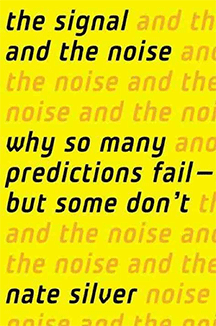By Amber Slater
The 2013 recipient of the Phi Beta Kappa Award in Science is Nate Silver’s The Signal and the Noise: Why So Many Predictions Fail — but Some Don’t (Penguin, 2012). Silver, who rose to political forecasting stardom in 2008 when he correctly predicted the outcome in 49 out of 50 states in the presidential election and also made correct predictions about the outcomes of all Senate races that year, draws readers into the world of forecasting in realms ranging from politics to natural disasters.
Silver received a Bachelor of Arts in Economics from the University of Chicago in 2000. While employed as an economic consultant with KPMG after graduation, he created the Player Empirical Comparison and Optimization Test Algorithm, or PECOTA, a forecasting system which examines the performance of hitters and pitchers in the MLB, which was later acquired by Baseball Prospectus.
After a brief stint in which he made a living primarily through earnings from online poker games, Silver turned to political forecasting, which led to the development of his blog, FiveThirtyEight. It is named for the 538 seats in the Electoral College and has been syndicated by The New York Times since 2010. Silver’s prowess for prediction has garnered widespread acclaim; he was named one of Time Magazine’s 100 Most Influential People In the World in 2009, and Fast Company recently ranked him first among the 100 Most Creative People in Business for 2013.
Currently, Silver is working on a partnership with ESPN in which FiveThirtyEight will expand its coverage beyond politics. While he still plans to make predictions regarding the 2016 presidential election, Silver also hopes to explore areas such as culture and technology on the redesigned website.
Similar to the current expansion of FiveThirtyEight, The Signal and the Noise examines forecasting and the art of prediction in many realms of life, ranging from chess to climate change. The book is named for the concepts of signal and noise in electrical engineering, in which the signal conveys information, while the noise is a random or meaningless fluctuation in the signal. Inspired by the theories of 18th century mathematician Thomas Bayes, Silver’s method of prediction involves looking past the noise of data and using previous examples as a model for forecasting.
Selected Book Reviews
“Mining Truth from Data Babel” Reviewed by Leonard Mlodinow for The New York Times
“The Signal and the Noise by Nate Silver – review” Reviewed by Ruth Scurr for The Guardian
“The Silver Fox” Reviewed by Matthew Yglesias for The Slate Book Review
“Review: Nate Silver’s insightful ‘The Signal and the Noise'” Reviewed by Alex Koppelman for The Los Angeles Times
The Phi Beta Kappa Award in Science has been offered annually since 1959. Its goal is to encourage scholarly contributions to the world of literature in the areas of the physical and biological sciences as well as mathematics.
For more information about this year’s book award winners, visit the Phi Beta Kappa website.
Amber Slater is a senior at McDaniel College majoring in English and Spanish. McDaniel College is home of the Delta of Maryland Chapter of Phi Beta Kappa.




